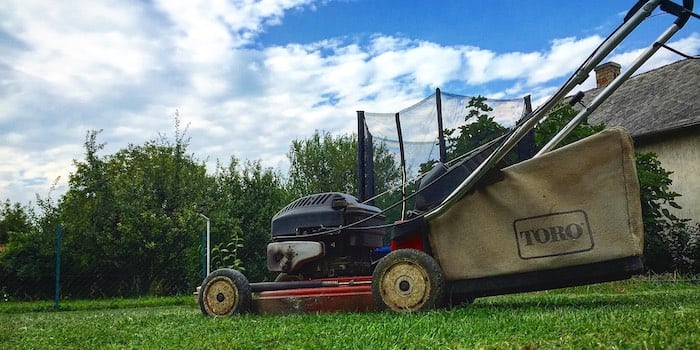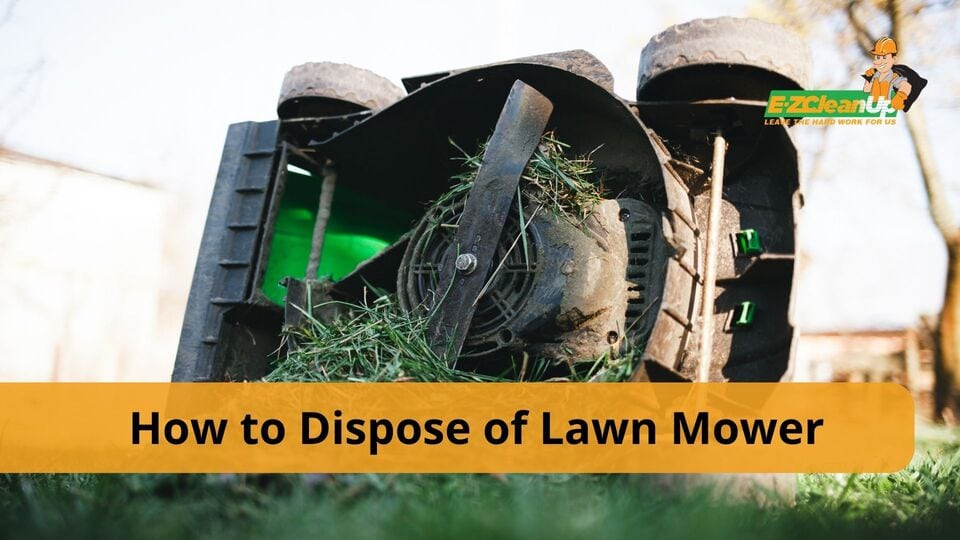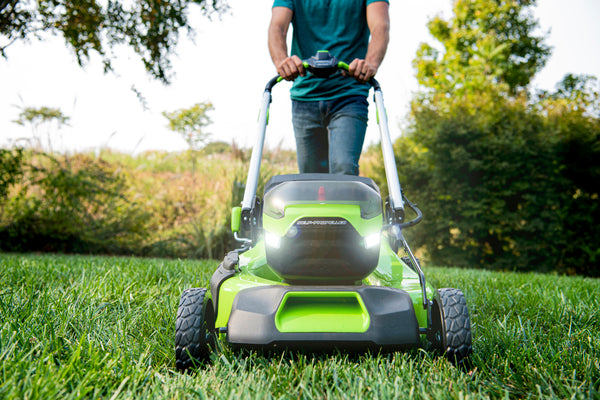To dispose of a lawn mower, take it to a recycling center or arrange a bulk trash pickup. Ensure it is free of gasoline and oil.
Disposing of a lawn mower responsibly is essential for environmental health. Before taking it to a recycling center or scheduling a bulk trash pickup, make sure it is completely drained of gasoline and oil. Many recycling centers accept lawn mowers and other small engines.
Some local waste management services offer bulk trash pickup, which may include lawn mowers. Check with your local municipality for specific guidelines and services available in your area. Proper disposal ensures that the materials are recycled, reducing waste and environmental impact. By following these steps, you contribute to a cleaner, greener environment.

Credit: trashwizard.com
Preparation
Disposing of a lawn mower responsibly requires preparation. Proper preparation ensures safety and efficiency. Follow these steps to get started.
Safety Precautions
Before you start, take necessary safety precautions. Always wear protective gloves and goggles. Make sure the mower is turned off and unplugged. Remove the spark plug to prevent accidental starts. Drain any fuel or oil from the mower. Store the fuel in a safe container.
Gathering Tools
Gather the needed tools for the job. You will need:
- Wrench set
- Screwdrivers
- Protective gloves
- Goggles
- Containers for fuel and oil
Having these tools ready will make the process easier.
Assessing Condition
Before disposing of your lawn mower, it’s crucial to assess its condition. This step helps you decide whether to sell, repair, or recycle it. Let’s break down the key areas to evaluate.
Usable Parts
Check if any parts are still in good condition. These can include:
- Blades: Sharp blades can be reused or sold.
- Engine: A working engine is valuable.
- Wheels: Intact wheels can be repurposed.
- Handlebars: Solid handlebars are useful for other projects.
Identifying usable parts helps in recycling or selling them. This way, you contribute less to landfill waste.
Repair Vs. Replace
Determine if repairing the lawn mower is feasible. Ask yourself these questions:
- Cost: Is the repair cost more than buying a new mower?
- Time: How much time will the repair take?
- Skill: Do you have the skills to fix it?
If the repair is too costly or time-consuming, it might be better to replace it. On the other hand, minor fixes can extend the life of your mower.
| Condition | Action |
|---|---|
| Good | Sell or Donate |
| Fair | Repair or Recycle |
| Poor | Recycle or Dispose |
By following these steps, you can make an informed decision. This will ensure the best disposal method for your lawn mower.
Recycling Options
Disposing of an old lawn mower in an eco-friendly way is essential. Recycling is a great option to consider. It helps reduce waste and supports sustainability. Below are some recycling options to explore.
Local Recycling Centers
Local recycling centers often accept lawn mowers. Call your nearest center to confirm. They may have specific requirements. Some centers need you to remove gas and oil first. This ensures safe recycling. You can find local centers through an online search.
Manufacturer Programs
Some lawn mower manufacturers offer recycling programs. These programs make it easy to recycle your mower. Check the manufacturer’s website for details. They often provide instructions and locations. Some may even offer discounts on new purchases. This is a great way to recycle and save money.

Credit: goloadup.com
Donation
Donating your old lawn mower can help those in need. Many organizations accept lawn mowers in good condition. This act is eco-friendly and helps the community.
Charitable Organizations
Charitable organizations are a great place to start. Many local charities accept lawn mowers. You can call them to ask if they need one.
- Check if the lawn mower is in working condition.
- Clean the lawn mower before donating.
- Make sure to remove personal tags or marks.
Some well-known charities include:
| Charity | Contact Information |
|---|---|
| Goodwill | 1-800-GOODWILL |
| Salvation Army | 1-800-SAL-ARMY |
| Habitat for Humanity | 1-800-HABITAT |
Community Programs
Community programs often look for lawn mowers. They use them for local projects. These programs help maintain parks and public spaces.
- Find local community centers or programs.
- Contact them to check their needs.
- Arrange a drop-off or pick-up.
Community programs can vary by location. Look for:
- Local gardening clubs
- Neighborhood associations
- School maintenance programs
Donating your lawn mower to these programs can make a big difference.
Selling
Do you have an old lawn mower you no longer need? Selling it is a great way to make some extra cash. There are several ways to sell your lawn mower easily. Let’s explore the best options.
Online Marketplaces
Online marketplaces are very popular for selling used items. Websites like Craigslist, Facebook Marketplace, and eBay are great choices. Here’s how you can get started:
- Take clear photos of your lawn mower.
- Write a detailed description.
- Set a fair price.
- Post your listing.
Clear photos and a detailed description help attract buyers. Setting a fair price ensures your mower sells quickly. Respond to inquiries promptly to keep buyers interested.
Yard Sales
A yard sale is another effective way to sell your lawn mower. This option allows you to sell other items too. Here’s how to prepare for a successful yard sale:
- Pick a good date and time.
- Advertise your yard sale.
- Set up your items neatly.
- Price your items reasonably.
Choose a weekend for more foot traffic. Advertising your sale on community boards and social media helps attract buyers. Arrange your items neatly to make them appealing.
By following these tips, you can easily sell your old lawn mower and make some extra cash.
Disposing Non-recyclable Parts
Disposing of non-recyclable parts of a lawn mower can be tricky. These parts include rubber tires, plastic components, and non-recyclable metals. Proper disposal ensures we protect the environment and follow local regulations.
Proper Disposal Methods
Here are some proper disposal methods for non-recyclable parts:
- Local Waste Management: Contact your local waste management service. They can guide you on how to dispose of these parts properly.
- Hazardous Waste Facilities: Some parts may be considered hazardous. Check if your local hazardous waste facility accepts them.
- Bulk Trash Pickup: Many cities offer bulk trash pickup services. Check the schedule and guidelines in your area.
Avoid throwing these parts in regular trash bins. They can harm the environment and local wildlife.
Environmental Impact
Improper disposal of non-recyclable parts can have severe environmental consequences. These parts can end up in landfills and take years to decompose. They may release harmful chemicals into the soil and water.
By properly disposing of these parts, we can reduce pollution. We can also help conserve natural resources and protect wildlife.
| Part | Disposal Method |
|---|---|
| Rubber Tires | Local Waste Management |
| Plastic Components | Hazardous Waste Facility |
| Non-Recyclable Metals | Bulk Trash Pickup |
Remember, proper disposal is key to protecting our environment. Always follow local guidelines and regulations.
Eco-friendly Alternatives
Disposing of your old lawn mower doesn’t have to harm the environment. Consider eco-friendly alternatives for a greener choice. This helps reduce landfill waste and promotes sustainable practices. Explore these options for a cleaner planet.
Electric Mowers
Electric mowers are a fantastic eco-friendly option. They produce zero emissions, reducing your carbon footprint. These mowers are quieter, causing less noise pollution in your neighborhood. Electric mowers also require less maintenance, saving you time and effort.
Consider these benefits of electric mowers:
- Zero emissions: No harmful gases released.
- Quiet operation: Lower noise levels compared to gas mowers.
- Low maintenance: Fewer parts to service or replace.
Electric mowers come in various models, including corded and cordless options. Corded mowers provide continuous power, while cordless models offer more mobility. Choose the type that best suits your lawn care needs.
Manual Push Mowers
Manual push mowers are another excellent eco-friendly alternative. They rely on human power, producing no emissions at all. These mowers are also very quiet, making them ideal for early morning or late evening use.
Manual push mowers offer several advantages:
- No emissions: Completely green and clean.
- Quiet operation: Virtually silent when in use.
- Exercise benefits: Provides a good workout while mowing.
Manual push mowers are easy to maintain and have fewer parts that can break. They are also lightweight, making them easy to maneuver around your yard. This type of mower is perfect for small to medium-sized lawns.

Credit: ezcleanup.com
Frequently Asked Questions
How Do I Recycle An Old Lawn Mower?
Recycling centers often accept old lawn mowers. Remove fluids and take it to a local recycling facility.
Can I Donate My Used Lawn Mower?
Yes, many charities accept used lawn mowers. Ensure it’s in good working condition before donating.
Where Can I Sell A Broken Lawn Mower?
You can sell a broken lawn mower online or to scrap metal dealers. Ensure to list all issues.
Should I Dispose Of Lawn Mower Oil Separately?
Yes, lawn mower oil is hazardous waste. Take it to a local hazardous waste disposal facility.
Conclusion
Properly disposing of your lawn mower is crucial for environmental safety. Follow local guidelines for recycling or disposal. Donate if it’s still functional. Consider eco-friendly options for future purchases. Responsible disposal helps protect our planet. Always stay informed and make environmentally conscious decisions.

